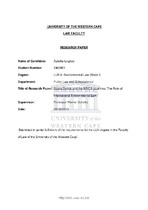| dc.contributor.advisor | Scholtz, Werner | |
| dc.contributor.author | Logday, Ayesha | |
| dc.date.accessioned | 2020-11-27T10:13:56Z | |
| dc.date.available | 2020-11-27T10:13:56Z | |
| dc.date.issued | 2019 | |
| dc.identifier.uri | http://hdl.handle.net/11394/7579 | |
| dc.description | Magister Legum - LLM | en_US |
| dc.description.abstract | Environmental Law is at the forefront of the global community and environmental
protection and conservation is regarded as of the utmost importance.1 Outer Space is
a unique, limited, and valuable resource. Outer space allows states to utilise
thousands of satellites for research, national defence, and communications. At the
inception of space law, only a few states dominated space activities and all human
space activities were so challenging that nearly any method seemed acceptable for
placing objects in outer space, currently more countries have space industries and
launch capabilities | en_US |
| dc.language.iso | en | en_US |
| dc.publisher | University of Western Cape | en_US |
| dc.subject | Space Debris | en_US |
| dc.subject | Orbital Debris | en_US |
| dc.subject | Developing states | en_US |
| dc.subject | BRICS (Brazil, Russia, India, China and South Africa) | en_US |
| dc.subject | Space junk | en_US |
| dc.title | Space Debris and the BRICS countries: The role of international Environmental Law. | en_US |
| dc.rights.holder | University of Western Cape | en_US |

